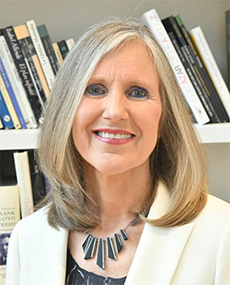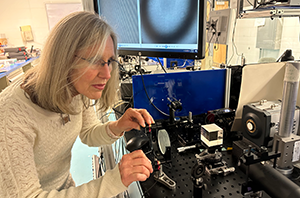2024 Joseph Fraunhofer Award/Robert M. Burley Prize Winner
Get Involved
Optica Names Carmen Menoni, the 2024 Joseph Fraunhofer Award/Robert M. Burley Prize Recipient
Optica is pleased to announce that Carmen Menoni, Colorado State University, USA has been selected as the 2024 recipient of the  Joseph Fraunhofer Award/Robert M. Burley Prize. Menoni is honored for seminal contributions to the materials aspects and engineering of amorphous oxides for optical coatings of high intensity lasers and gravitational wave detectors.
Joseph Fraunhofer Award/Robert M. Burley Prize. Menoni is honored for seminal contributions to the materials aspects and engineering of amorphous oxides for optical coatings of high intensity lasers and gravitational wave detectors.
Menoni is University Distinguished Professor in the Departments of Electrical and Computer Engineering and Chemistry at Colorado State University. She obtained her PhD in physics from Colorado State University, USA and shortly after joined the faculty in the Department of Electrical and Computer Engineering at Colorado State University.
Menoni’s group has made recognized contributions to optics in two areas. Her research is pushing the frontiers in dielectric coatings for ultra-high intensity lasers and gravitational wave detectors. This work is supported by fundamental studies of network organization in the amorphous dielectrics and its impact in the optical and structural properties of the thin films. Menoni has also pioneered the use of bright extreme ultraviolet laser beams in novel nanoscale imaging and spectrometry methodologies.
She serves as Director of a recently established Inertial Fusion Energy hub, RISE, supported by the Department of Energy IFE STAR Program, Fusion Energy Science. The RISE hub, a partnership among universities, US national laboratories and industry, provides the framework to investigate innovative laser interaction and target technologies with the goal to accelerate inertial fusion energy and train the workforce that will support its practical implementation.
Menoni has received multiple awards including the IEEE Women in Photonics Excellence Award and the Willis Lamb Award for Laser Science and Quantum Optics. She is a Fellow of Optica, the Institute of Electrical & Electronic Engineers (IEEE), the American Physical Society (APS), the American Association for the Advancement of Science (AAAS) and SPIE. Menoni has served the optics and photonics community through her participation in prominent editorial and governing boards.
First presented in 1982, the Fraunhofer Award recognizes significant research accomplishments in the field of optical  engineering, and honors the contributions that Joseph Fraunhofer made to the field. The prize was added in 1992 in memory of Robert M. Burley, who exemplified many of the highest attributes of the optical engineer and was the first recipient of the award. The award and prize are endowed by the Baird Corporation, the Burley Family, and Prof. Shin-Tson Wu.
engineering, and honors the contributions that Joseph Fraunhofer made to the field. The prize was added in 1992 in memory of Robert M. Burley, who exemplified many of the highest attributes of the optical engineer and was the first recipient of the award. The award and prize are endowed by the Baird Corporation, the Burley Family, and Prof. Shin-Tson Wu.
About Optica
Optica, Advancing Optics and Photonics Worldwide, is the society dedicated to promoting the generation, application, archiving and dissemination of knowledge in the field. Founded in 1916, it is the leading organization for scientists, engineers, business professionals, students and others interested in the science of light. Optica’s renowned publications, meetings, online resources and in-person activities fuel discoveries, shape real-life applications and accelerate scientific, technical and educational achievement.
